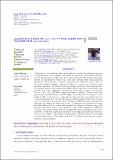| dc.description.abstract | Allelopathy is the inhibitory effect of one plant on another by releasing chemicals through leaching, root exudation and residue decomposition. Allelopathic inhibition involves the interaction of different classes of chemicals which affect germination, plant growth and development. Studies have been done showing that Bidens pilosa has allelopathic effects on maize, sorghum and lettuce but information on it’s effect on Amaranthus dubius is lacking. Amaranthus dubius has become one of Kenya’s most important vegetables. It’s famous for its high protein content and medicinal properties. This study was done to investigate allelopathic effects of B. pilosa on germination and growth of A. dubius. Different concentrations of B. pilosa extract were prepared (0%,25%, 50%, 75%, and 100%) using tap water as control . Twenty seeds were germinated in petri dishes lined with filter paper, then soaked with the aqueous extract solutions. The treatments were replicated four times and data was collected for two weeks. Growth tests were carried out in the greenhouse using 24 3Litre pots. Twenty seeds were planted in each pot and leaves of B.pilosa of different amounts (0g, 20g, 40g, 60g, 80g, and 100g) were added into the soil. Treatments were replicated four times and data collected for six weeks and subjected to Analysis of Variance using SAS package. Treatment means were compared using Least Significance Difference (P≤0.05). The aqueous extract of B. pilosa significantly reduced germination rate. Fresh leaf biomass of B. pilosa significantly increased shoot height, leaf number,and leaf area, fresh and dry weights. Leaf biomass of B. pilosa had no significant effect on root length and chlorophyll content. The study revealed that B. pilosa has potential use as green manure in crop production. | en_US |

